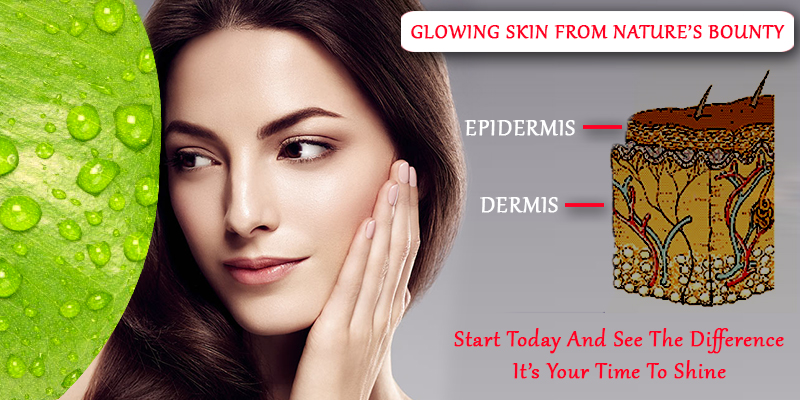GLOWING SKIN FROM NATURE’S BOUNTY
The skin is the largest organ in the human body. It has three main functions-protection, regulation and sensation. Wounding or other skin issues can disrupt the functioning of skin. Hence, a clear skin is often an indication of a healthy body and vice versa holds true too. No wonder we crave for a flawless complexion. Of course it is winsome and ticks all the boxes in the look department too. But the health of your skin isn’t just skin deep. There’s more to it than what meets the eye.
To enhance the health of your skin, it is crucial to understand the structure of skin and how it functions.
The skin consists of two layers: the epidermis and the dermis. Beneath the dermis lies the hypodermis or subcutaneous fatty tissue.
The skin is an organ of protection. The primary function of the skin is to act as a barrier. The skin provides protection from: mechanical impacts and pressure, variations in temperature, micro-organisms, radiation and chemicals.
The skin is an organ of regulation. The skin regulates several aspects of physiology, including: body temperature via sweat and hair, and changes in peripheral circulation and fluid balance via sweat. It also acts as a reservoir for the synthesis of Vitamin D.
The skin is an organ of sensation. The skin contains an extensive network of nerve cells that detect and relay changes in the environment. There are separate receptors for heat, cold, touch, and pain. Damage to these nerve cells is known as neuropathy, which results in a loss of sensation in the affected areas. Patients with neuropathy may not feel pain when they suffer injury, increasing the risk of severe wounding or the worsening of an existing wound.
Acne is a very common skin condition that affects majority of the population. It is also one of the most notorious skin problems. It takes away the smooth luster of the skin. It is caused by the overproduction of sebum. Sebum is an oily substance that forms in glands just under the surface of the skin called sebaceous glands. Sebum normally flows out hair follicles onto the skin to act as a natural skin moisturizer. The glands are connected to hair follicles that allow the sebum, or oil, to empty onto the skin through a pore. If hair follicles become blocked by sebum, dead skin cells, and bacteria, acne is the result. The sebaceous gland units are most commonly found on the face, neck, and back. By affecting the face, acne can directly affect self-image by making us look and feel unattractive; which leads to embarrassment, lack of self-confidence and lowered self esteem.
So, what causes acne? Acne has several reasons. Some of them are:
- Stress and anxiety
- Humidity or exposure to dirt
- Premenstrual changes or hormonal changes
- Physical irritation from occlusive clothing, headbands, hats, helmets, etc
- Use of certain medications, such as phenytoin, isoniazid, phenobarbital, lithium, quinine, rifampin and steroids.
There are some steps that can be taken to prevent an acne outbreak. They include :
- Never squeeze or pick acne lesions.
- Establish a daily skin-care regimen, which includes cleansing the skinwith a soft wash cloth, warm water and an appropriate facial soap at least twice a day.
- Use only oil-free skin and hair care products.
- Avoid scrubbing the skin when cleansing.
- Use makeup that is oil-free or labeled “non-comedogenic.”
- Always cleanse skin after sweating.
- Wear daily sun protection, since some acne medications may increase the skin’s sensitivity to sunlight.
When it comes to treating acne or other skin conditions, it is imperative to go for something sans the after effects. It’s always safer to go the natural way:
- Curcumin, the best possible remedy from Nature’s own bounty. Curcumin is anti-bacterial, is 36 times stronger than azelaic acid; is anti-fungal, capable of killing Candida yeasts and is also anti-inflammatory.
- All these properties make Curcumin potentially useful in treating not only acne but other skin related-disorders. Scientifically speaking, Curcumin inhibits the mTor-pathway, which is sort of a master regular in acne.
- When applied topically, it can kill bacteria and reduce acne-causing inflammation. When taken internally it may reduce some of the risk factors behind acne.
- Curcumin, when applied to the skin, is proven to effectively soothe the skin and neutralize free radicals with antioxidant properties. Free radicals can lead to inflammation and damage to cells’ DNA and other cellular organelles.
- But for Curcumin to be effective in treatment, it should be pure, organic and chemical-free. Dermaturm is a product of Bagdara Farms,having high levels of curcumin. It is 100 % pure, organic and free of pesticides and chemicals. This product has to be consumed.
Start today and see the difference. It’s your time to shine.
